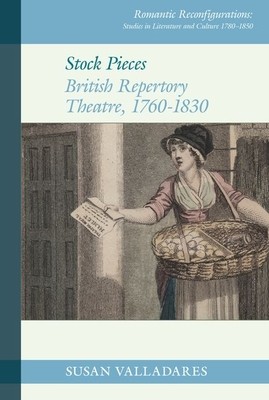
- We will send in 10–14 business days.
- Author: Susan Valladares
- Publisher: Liverpool University Press
- ISBN-10: 1835537863
- ISBN-13: 9781835537862
- Format: 15.6 x 23.4 x 1.8 cm, hardcover
- Language: English
- SAVE -10% with code: EXTRA
Stock Pieces: British Repertory Theatre, 1760-1830 (e-book) (used book) | bookbook.eu
Reviews
Description
What do we gain from watching a familiar play for the nth time? This was a crucial question for Romantic-period theatre managers, who, to deliver varied programmes, relied on a repertoire of 'stock' entertainments performed in alternation with the latest plays. Repertory theatre was not new to the Romantic period, but it took on additional purchase at a time when the playhouse was not simply a site for entertainment but a government-controlled cultural institution and business subject to sometimes extreme financial, political, and ideological pressures.
Through an innovative selection of case studies drawn from deep archival research, Stock Pieces juxtaposes canonical with otherwise forgotten entertainments; unites the period's professional and amateur dramatic cultures; and spans British metropolitan, provincial and imperial geographies. The picture that emerges is fresh and compelling. It is not Shakespeare who takes centre stage here, but the near contemporaries whose repertoire status he came to undermine, and the adaptors of his work (from pantomime arrangers to enslaved performers in Jamaica) who transformed its aesthetic and cultural values; while it is the revival and reenactment of the horrific, violent spectres of the slave trade and slavery that recur again and again. Stock Pieces gives powerful testimony of how the Romantic-period dramatic repertoire could be mobilised to signify social and political practices that operated outside the theatrical institution, crossed national borders, and dared to effect real change.
EXTRA 10 % discount with code: EXTRA
The promotion ends in 20d.17:26:32
The discount code is valid when purchasing from 10 €. Discounts do not stack.
- Author: Susan Valladares
- Publisher: Liverpool University Press
- ISBN-10: 1835537863
- ISBN-13: 9781835537862
- Format: 15.6 x 23.4 x 1.8 cm, hardcover
- Language: English English
What do we gain from watching a familiar play for the nth time? This was a crucial question for Romantic-period theatre managers, who, to deliver varied programmes, relied on a repertoire of 'stock' entertainments performed in alternation with the latest plays. Repertory theatre was not new to the Romantic period, but it took on additional purchase at a time when the playhouse was not simply a site for entertainment but a government-controlled cultural institution and business subject to sometimes extreme financial, political, and ideological pressures.
Through an innovative selection of case studies drawn from deep archival research, Stock Pieces juxtaposes canonical with otherwise forgotten entertainments; unites the period's professional and amateur dramatic cultures; and spans British metropolitan, provincial and imperial geographies. The picture that emerges is fresh and compelling. It is not Shakespeare who takes centre stage here, but the near contemporaries whose repertoire status he came to undermine, and the adaptors of his work (from pantomime arrangers to enslaved performers in Jamaica) who transformed its aesthetic and cultural values; while it is the revival and reenactment of the horrific, violent spectres of the slave trade and slavery that recur again and again. Stock Pieces gives powerful testimony of how the Romantic-period dramatic repertoire could be mobilised to signify social and political practices that operated outside the theatrical institution, crossed national borders, and dared to effect real change.


Reviews